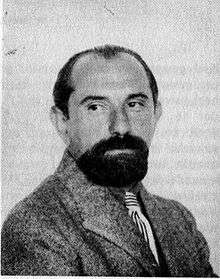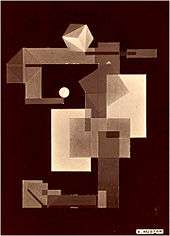Vilmos Huszár
Vilmos Huszár (1884–1960) was a Hungarian painter and designer. He lived in The Netherlands, where he was one of the founder members of the art movement De Stijl.
Vilmos Huszár | |
|---|---|
 | |
| Born | Vilmos Herz January 5, 1884 |
| Died | September 8, 1960 (aged 76) |

Huszár was born in Budapest, Hungary. He emigrated to The Netherlands in 1905, settling at first in Voorburg. He was influenced by Cubism and Futurism. He met other influential artists including Piet Mondrian and Theo van Doesburg, both central figures in establishing the De Stijl movement with Huszár in 1917. Huszár also co-founded the De Stijl magazine and designed the cover for the first issue.
In 1918 he designed interior colour schemes for the bedroom of Bruynzeel house in Voorburg. From 1920 to 1921 he collaborated with Piet Zwart on furniture designs. He left the De Stijl group in 1923. He collaborated with Gerrit Rietveld on an exhibition interior for the Greater Berlin Art Exhibition. From 1925, Huszár concentrated on graphic design and painting.

In 1926 he created a complete visual identity for Miss Blanche Virginia cigarettes, which included packaging, advertising, and point of sale displays. The concept drew on the imagery associated with the emergent "New Women", or Flappers. The Flappers were perceived as young, single, urban, and employed, with independent ideas and a certain disdain for authority and social norms. The smoking of cigarettes was closely associated with their newfound independence.
The whereabouts of many of Huszár's works are unknown. Many of his paintings and sculptures are only known through photographs that appeared in De Stijl, or from photographs taken by the artist himself. Works that are lost include the Dancing mechanical doll, a device that could adopt several different postures and was used during Dada conferences in the early 1920s.
Huszár died in the Dutch town Harderwijk in 1960.
From 8 March to 19 May 1985 a large Huszár retrospective was held at the Gemeentemuseum in The Hague.
External links
- Artcyclopedia Links to Vilmos Huszár's works
- Brief biography
- Short biography (in german)
- Video reconstruction of 'Mechanical Dancing Figure' by Huszár in 1922
| Wikimedia Commons has media related to Vilmos Huszár. |